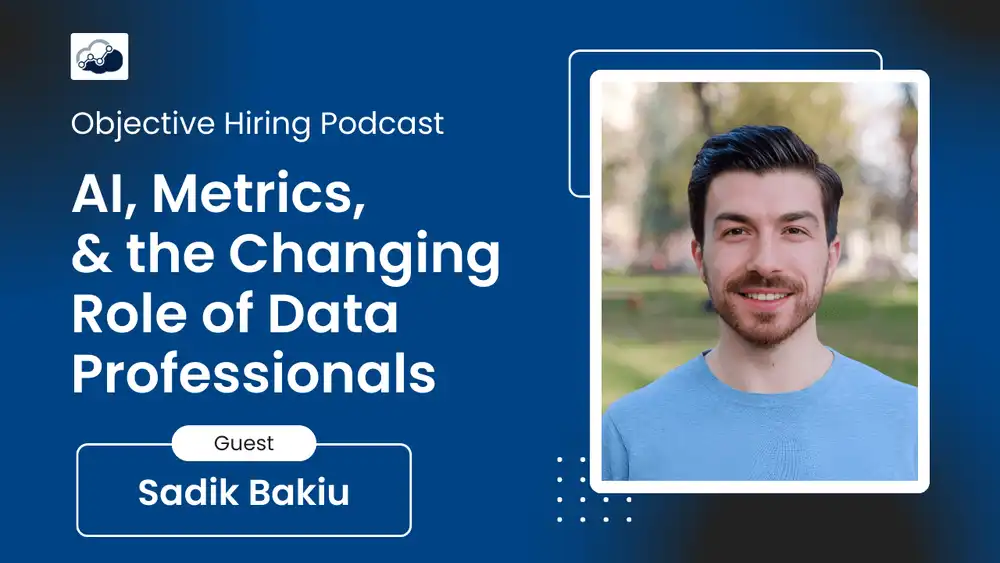Sadik Bakiu Explores the Evolving Roles of Data Professionals

Sadik Bakiu Explores the Evolving Roles of Data Professionals
In a recent episode of the Objective Hiring podcast, Tim Freestone sat down with Sadik Bakiu, CEO and Data Expert at Data Max, to explore how artificial intelligence (AI) is reshaping the roles of data professionals. From analysts to engineers, AI is driving a paradigm shift in how these roles function and what skills are now critical for success.
The Impact of AI on Data Roles
AI is significantly altering the day-to-day responsibilities of data analysts, scientists, and engineers. Sadik highlighted how tools powered by AI are automating tasks like data exploration and anomaly detection, which were traditionally time-consuming and manual.
“AI can help a lot with data exploration,” Sadik explained. “It can point you to the more interesting bits of data or the outliers that need attention, making the process much faster.”
This shift allows data professionals to focus on higher-value tasks, such as interpreting results and crafting strategies based on insights. However, it also changes the skill set required for these roles.
Lowering the Barrier to Entry
One intriguing point Sadik raised was how AI is lowering the barrier to entry for data roles. With AI tools becoming increasingly user-friendly, domain experts from fields like marketing and product management can now perform basic data tasks without needing extensive technical training.
“Domain experts can articulate in plain language what they want to achieve,” Sadik said. “They only need an assistant—AI—to write the code or prepare the dashboard for them.”
This development could democratise data-related roles, enabling more people to contribute to data-driven decision-making. However, it also raises questions about the future of traditional data roles and the skills required to succeed.
From Code Writers to Supervisors
As AI takes over routine coding tasks, the role of data professionals is evolving from being code writers to supervisors of AI-generated outputs. Sadik described this as a transition that requires a deep understanding of the underlying processes to ensure quality and accuracy.
“The transition is more from a writer to a supervisor of what AI is producing,” he explained. “To be a good supervisor, you need to be an expert in it.”
This shift places a greater emphasis on critical thinking and problem-solving skills, as data professionals must validate and refine the outputs generated by AI tools.
Adapting Hiring Strategies
Given these changes, hiring strategies for data roles must also evolve. Sadik emphasised the importance of finding candidates who possess both technical expertise and the ability to adapt to rapidly changing technologies.
“You need to evaluate the depth of a candidate’s knowledge and their ability to solve complex problems,” he said. “This requires a mix of structured tests and open-ended questions.”
Platforms like Alooba can help companies assess candidates objectively, focusing on their skills and problem-solving abilities. If you're looking to improve your hiring process for data roles, sign up for Alooba today.
Balancing Technical and Soft Skills
The discussion also touched on the balance between technical and soft skills in hiring data professionals. While technical skills remain critical, soft skills such as communication and teamwork are increasingly important, especially in collaborative environments.
“If you hire someone with strong technical skills but poor soft skills, it can create a hostile environment,” Sadik cautioned. “On the other hand, hiring someone with excellent soft skills but lacking technical expertise may not be productive.”
Striking the right balance is crucial for building effective teams that can adapt to the evolving demands of data-driven roles.
Preparing for the Future
Looking ahead, Sadik believes that the roles of data professionals will continue to evolve as AI becomes more integrated into workflows. He advised companies to remain flexible and open to change, constantly re-evaluating their hiring processes and the skills they prioritise.
“The world is not waiting for you,” he said. “You need to be rethinking your processes and adapting to new technologies.”
For data professionals, this means staying ahead of the curve by continuously updating their skills and embracing new tools and methodologies.
Listen to the Full Episode
To hear more of Sadik’s insights on the future of data roles and hiring strategies, tune in to the full episode of the Objective Hiring podcast with Tim Freestone.